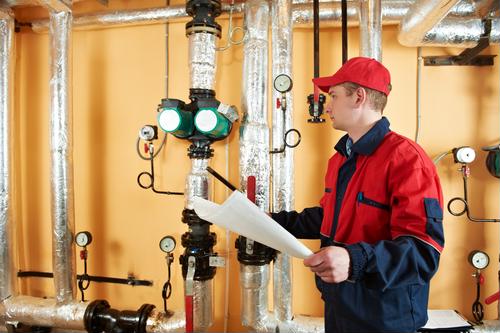Industrial maintenance helps you break down the silos, do more with less, and take your business to the next level. Did we mention enough business buzzwords? OK. We just wanted to point out that industrial maintenance has absorbed so many tasks and meanings, it's getting bigger than "boiling the ocean."
From AI and automation training to welding and motor control – it's in there. But we still need it to stay competitive and prepare our enterprises for the wave of future innovations in mechanics and IT heading our way these days.
So let's break it down and see what an industrial maintenance technician's job looks like and how you can guard your team against those changes.
Don't worry; we're here to help you. In this post, we'll go over:
- Different types of maintenance and the purposes they serve.
- Every strategy and skill an industrial maintenance mechanic should master.
- How the applied technology will change in the midst of the AI revolution.
- The role technical maintenance plays in guaranteeing smooth operations in manufacturing.
Ready? Then start your engines.
Types of industrial maintenance
When we distinguish among different types of industrial maintenance, we usually don't mean machinery repairs or troubleshooting fluid power. Squeaky wheels are no fun, but we're referring to the goals which various kinds of maintenance address.
That splits all efforts into two large categories: corrective and preventive maintenance.
With preventive maintenance, you establish a regular schedule for machinery inspections to avoid any longtime outages and failures during production. As such, it's a condition-based approach, that is, machine squeaks, mechanic runs.
Sometimes, these techniques can be supplemented with predictive maintenance, the crystal ball of maintenance, only without incense and laying on of hands. Here, the technician uses applied science such as labor statistics, data analysis and machine learning to predict patterns in your machines' temperature, vibration or fluid power. That way, inspectors can tell how your equipment will perform ahead of malfunctions.
Then we've got corrective maintenance, which requires more flexibility and planning because your team will only act when equipment is already failing. Here, you're focusing on overall reliability rather than the current condition, and you're trying to identify the most critical repairs necessary to get the system back up and running.
Industrial maintenance technicians: Skills and training
Now is probably the point when we'll tell you that industrial maintenance technicians need technical knowledge, right?
Well, duh. Obviously, a technician should know their way around industrial technology such as electrical and hydraulic systems, heavy machinery and sometimes even robotics. The type of knowledge they need will naturally depend on their employer and the industrial equipment they work on. But there are some general skills every technician needs.
For example, it doesn't hurt to have a good grasp of technical diagrams, schematics and instruction manuals. This also means being able to distinguish the necessary information from the superfluous while under time pressure – a bit like trying to win a shell game during a hurricane. So troubleshooting and problem-solving skills are a big plus, and if you can evaluate several technical options or improvise mechanics solutions, even better.
Since every technician will be running routine inspections and maintenance tasks, it's crucial to have decent time management and prioritization skills. And while we're throwing those management buzzwords out there, being adaptable under changing priorities and technological innovations will go a long way. Handling tools and calibrating equipment is just the ice pigging on the pipe.
Finally, you should be able to override your left and right brain hemisphere. As a technician, you'll analyze loads of data and diagnose highly technical problems. However, once you've done that, it's important that you can effectively communicate your findings to supervisors and operators. Scotty may have fixed the Enterprise, but he was a tad grumpy for a role model.
Industrial maintenance technology and the future of maintenance
OK, your technicians are speed-reading technical manuals, and they even get along well with their wrenches — how can you prepare them for future changes?
Given that they're already skilled and flexible, you don't have to perform miracles here. For the most part, you'll need to redefine what being flexible means. These days, every industry is right in the middle of a technological revolution, with the Internet of Things, augmented reality, robotics and automation changing the rules.
If your team is only following your industry, you could be missing out. Every technician not only has to stay on top of their niche; they also need to educate themselves about emerging technologies across industries, be it through workshops, industry conferences or online resources.
Maybe this continuing education even opens the door to cross-industry collaboration. Either way, expect a continuous time commitment from your entire team, not just your industrial mechanic, and make it part of your official plans so that production doesn't suffer from the research that keeps it running.
Even today, being a technician is no longer about mechanics alone. That's why it's best to integrate constant learning and digital literacy into your company culture to incentivize your technicians to acquire the necessary programming and data analysis skills.
While some industries might get away with taking a broad approach to all those new technologies, each technician should sooner or later specialize so they can physically manage the ever-faster innovation in their respective field, whether that's IoT maintenance or AR-assisted reparation.
What's the role of industrial maintenance in manufacturing and production?
Imagine your whole business running smoothly with no technical problems at all. No outages are interrupting your workflow, your workers have only heard about rumors of accidents and you've even optimized your assets to perfection to squeeze out the last bit of productive time.
That's basically what mechanics and technicians can do for your business if you let them off the chain.
Apart from automation and overall strategies like condition-based maintenance, skilled technicians will also borrow tactics from other fields to keep your business afloat. One example of this is lean maintenance, where your entire team focuses on optimizing workflows to reduce non-value-adding activities and waste.
Such transformative initiatives can make you look at the technician's job through new eyes.
Another tool in your arsenal against downtime is a reliable computerized maintenance management system (CMMS). Once your technicians have run through everything we discussed, they can organize and schedule maintenance tasks, manage spare parts inventory and so much more.
As it happens, we've developed a great CMMS tool here at MicroMain, and we'd love you to give it a try. We've been supporting the maintenance management industry with our specialized solutions for over 30 years, and we continue to keep learning in order to serve our customers in tackling tomorrow's problems.
 For immediate assistance, please call us at (512) 328-3235
For immediate assistance, please call us at (512) 328-3235


